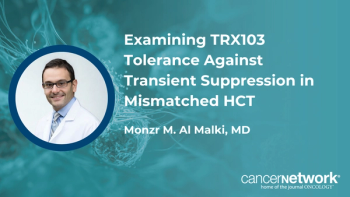
Adiponectin Levels May Protect Against Myeloma Development
Higher levels of the hormone adiponectin may protect against the development of multiple myeloma in overweight and obese individuals.
Higher levels of adiponectin, a hormone with anti-proliferative and anti-inflammatory properties, may protect against the development of multiple myeloma in overweight and obese individuals, according to a new study
“We found that high adiponectin levels were associated with a statistically significantly reduced future risk of multiple myeloma in this study involving multiple myeloma cases and matched controls from seven cohorts,” wrote researcher Jonathan N. Hofmann, PhD, MPH, of the division of cancer epidemiology and genetics at the National Cancer Institute, and colleagues. “The consistency in the association between adiponectin and multiple myeloma across cohorts, with inverse associations observed in all but one study, lends further support to our hypothesis.”
According to the study, obesity has been linked with increased risk for multiple myeloma and prior research has shown that decreased levels of adiponectin may be the cause for this risk. Hofmann and colleagues looked at prediagnosis levels of adiponectin taken from archived peripheral blood samples to determine if there was any association between the hormone levels and myeloma risk.
The study included 624 patients with myeloma and 1,246 matched control patients taken from 7 cohorts in the Multiple Myeloma Cohort Consortium.
Analysis of the blood samples revealed that adiponectin levels were lower among patients who were obese compared with normal weight patients, and that levels of adiponectin among control patients increased with increasing age.
When patients with the highest levels of adiponectin were compared with those with the lowest levels, the researchers found a 36% reduced risk for myeloma (odds ratio [OR], 0.64 [95% CI, 0.47–0.85]).
When the researchers stratified patients by body mass index, they found an inverse association between adiponectin levels and myeloma risk among both obese and overweight individuals. Obese or overweight individuals with the highest levels of adiponectin had a significantly reduced risk for myeloma compared with those with the lowest levels (OR, 0.41); however, no such association was seen when the analysis looked at only normal weight individuals.
“Efforts to control obesity may reduce the incidence of multiple myeloma, possibly by modulating circulating adiponectin levels. Given that circulating levels of adiponectin are strongly negatively correlated with the amount of visceral adipose tissue, reducing central obesity may be particularly important,” the researchers wrote. “Furthermore, adiponectin receptor agonists are being studied as drug candidates for metabolic diseases; our data support the possibility that they may be useful in multiple myeloma prevention or treatment.”
Newsletter
Stay up to date on recent advances in the multidisciplinary approach to cancer.












































